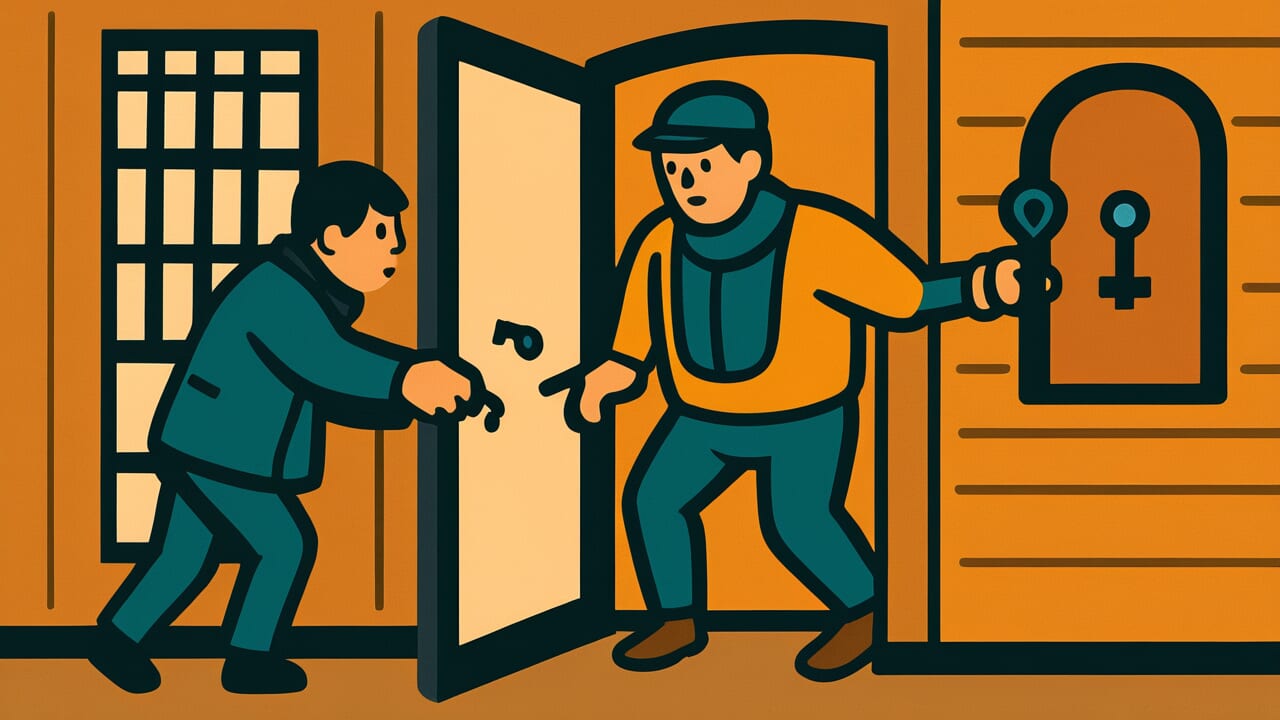How to Read “Even a thief locks his doors”
Nusubito mo tojimari
Meaning of “Even a thief locks his doors”
“Even a thief locks his doors” is a proverb that describes the contradictory nature of humans.
Even people who do bad things are careful about protecting their own safety and possessions.
It points to the ironic situation where a thief who steals from others carefully locks his own house to prevent being robbed.
This proverb is used when criticizing someone or making an ironic comment.
It effectively points out the selfish attitude of people who cause trouble for others but become very cautious when it comes to protecting themselves.
It also calmly observes the essential human nature that everyone has the instinct for self-preservation.
Even today, this expression fits perfectly when someone who commits fraud is sensitive about their own rights and interests.
It also applies when someone who breaks rules becomes strict when they themselves become a victim.
Origin and Etymology
The exact first appearance of this proverb in literature is unclear.
However, it is believed to have been used among common people during the Edo period.
Looking at the structure of the phrase, the combination of contrasting elements “thief” and “locking doors” is striking.
A thief is someone who sneaks into other people’s homes and steals their belongings.
The proverb points out the contradictory behavior of such a person carefully locking their own residence.
It is thought to have emerged from the sharp observation of human nature within Edo period townspeople culture.
Edo at that time had a dense population with many collective housing units like row houses.
Theft was a familiar problem in daily life.
In such an environment, common people calmly observed the human nature that even wrongdoers try to protect themselves.
What makes this expression interesting is that it contains a kind of resignation and human understanding rather than simple condemnation.
Even bad people are not completely bad and still possess the instinct for self-preservation.
It captures the complexity of human nature.
Rather than a moral sermon, this proverb reflects the perspective of Edo commoners who calmly described the contradictory nature of humans.
Usage Examples
- That politician committed corruption, yet hires multiple lawyers to defend himself against his own scandals—truly “Even a thief locks his doors”
- The neighbor who repeatedly parks illegally makes a huge fuss when his own car gets scratched—this is exactly “Even a thief locks his doors”
Universal Wisdom
The proverb “Even a thief locks his doors” reveals a fundamental human contradiction.
No matter how cruel someone’s actions toward others may be, they never lose the instinct to protect themselves.
This brilliantly captures the complexity of human existence.
What makes this universal truth interesting is that it shows the boundary between good and evil is not clearly divided within humans.
There is no such thing as a completely evil person.
Even among those who commit wrongdoing, the instinct for self-preservation remains—a form of normal humanity in a sense.
This proverb also highlights the essence of human selfishness.
People may lack the imagination to understand how their actions affect others.
Yet their sensitivity to being harmed themselves remains sharp.
This asymmetry may be at the root of many social problems.
Our ancestors created this proverb not to condemn humanity but because they deeply understood human nature.
In everyone’s heart exists a balance between consideration for others and self-preservation.
This proverb acknowledges that imperfection and still shows the wisdom of maintaining human society despite it.
When AI Hears This
The behavior of a thief locking doors demonstrates a strange stable state created by what game theory calls “common knowledge.”
Common knowledge means a situation where everyone knows something, and everyone knows that everyone knows it.
In the world of thieves, the fact that “anyone might steal” becomes common knowledge.
What’s interesting here is that thieves themselves cannot trust other thieves.
The famous prisoner’s dilemma theory explains situations where everyone would benefit from cooperation.
Yet because they cannot trust each other, everyone chooses betrayal.
The world of thieves is exactly this—cooperation of “not stealing” cannot be established.
This is because anyone who betrays alone gains a large benefit.
As a result, a state where everyone defends becomes a Nash equilibrium.
This means a stable state where no one has a reason to change their strategy.
Even if you are a thief yourself, you lose if you stop locking your doors.
This is the result of purely rational calculation, not moral conscience.
What’s even more ironic is that everyone continues to pay the cost of locking doors.
Compared to a world where no one steals, everyone loses.
In a world without trust, the wasteful expense of defense costs becomes eternally necessary.
A thief’s door-locking is a microcosm of the social costs created by lack of trust.
Lessons for Today
What this proverb teaches modern people is the importance of noticing the double standards within yourself.
All of us sometimes have different attitudes toward others versus ourselves without realizing it.
Are you harsh about others’ mistakes at work but make excuses for your own?
Do you talk about environmental issues but cannot give up your own convenience?
Do you criticize others on social media but overreact when you yourself are criticized?
This proverb becomes a mirror for noticing such contradictions.
The important thing is not to become a perfect person.
It is to acknowledge that everyone has the instinct for self-preservation, then gradually exercise imagination toward others.
What you find unpleasant, others might also find unpleasant.
If you assert your own rights, respect the rights of others too.
This proverb reminds us of such obvious things.
While acknowledging human imperfection, the attitude of trying to build better relationships is what defines a mature adult.



Comments